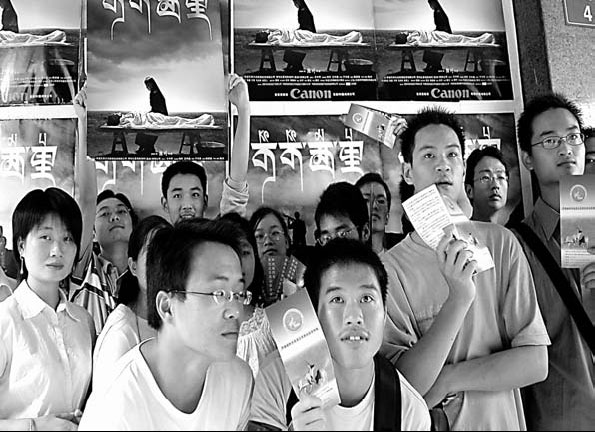
Cinema-goers await the first showing of Hoh Xil in Xiamen, Fujian province, on Nov 11, 2004. File photo
The Beijing High People's Court said yesterday stiffer punishments will be imposed for online piracy at Internet cafes.
The order comes as three local courts dealt with 10 movie copyright infringement cases by Internet cafes yesterday.
In one case, China's top movie producer, Huayi Brothers, won its lawsuit against three cafes.
The Xicheng District People's Court ruled that when the cafes screened Mountain Patrol without the authorization of Huayi, the film's lawful copyright holder on the mainland, they had infringed Huayi's right to online dissemination of information. The court ordered the cafes to remove the movie from their online services immediately and pay 6,000 yuan ($860) to 8,000 yuan as compensation to Huayi.
The Dongcheng and Chaoyang district people's courts also dealt with seven other similar cases yesterday. They ruled the accused cafes were guilty of infringement.
One of the cases concerned the copyright infringement of the movie Assembly, which is also by the Huayi Brothers, shown before the Chinese New Year in January. The cafe was ordered to pay compensation of 23,000 yuan.
"Copyright infringement by Internet cafes has become a new phenomenon in intellectual property right (IPR) cases," Chen Jinchuan, the acting president of the IPR tribunal of the Beijing High People's Court, told a press conference.
"Lodging lawsuits against Internet cafes is becoming common as copyright holders want to maintain their rights and interests," Chen said.
The judge said infringements by Internet cafes usually occur in two ways.
Some outlets download movies without authorization - this infringement is obvious - while others sign movie service agreements with suppliers who claim to have obtained copyright authorization.
"However, this does not absolve the cafes as they have to show proof of copyright agreement," Chen said.
He said that Internet cafes should always check every film provided by their suppliers for genuine copyright agreements.
In the cases yesterday, the Beijing courts adopted the principle of "full compensation", in line with the Supreme People's Court's order.
The order is also meant to "lower the cost of maintaining the lawful copyrights of people, increase the cost to those who infringe those rights and ensure that copyright holders receive appropriate compensation".
Data show the number of Internet users in China has surpassed 210 million. One-third of them surf at Internet cafes, where a majority of them watch movies.
IPR-related cases have been on the rise in Beijing.
Last year, courts in the capital dealt with more than 2,600 IPR-related disputes, an increase of 11 percent on 2006.
Beijing's two intermediate courts and the Beijing High People's Court handled 530 such cases, an increase of 15 percent.
(China Daily April 24, 2008)